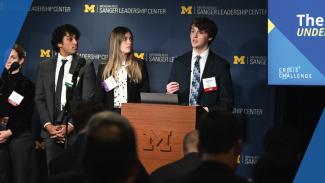Students Tackle Tech Trouble at the 2024 Leadership Crisis Challenge

More than 400 students, including 369 Ross School of Business students, competed in this year’s Leadership Crisis Challenge on Jan. 25-26.
LCC saw another record turnout
The Leadership Crisis Challenge, an annual event put on by the Sanger Leadership Center, put students from across the University of Michigan in the role of C-suite executives and challenged them to handle a simulated crisis. The competition measured students’ abilities to act strategically, navigate ambiguity, and communicate with impact while connecting with a network of peers, alumni business leaders, and faculty at The Big House.
With 416 total student participants, LCC saw the largest turnout in the program's history for the second year in a row, with more than 100 additional students participating over last year’s challenge.
The Sanger Leadership Center also invited back nearly 100 external partners and alumni for the 2024 challenge, the most ever to return to Michigan Ross for the event.
All students from across U-M were invited to participate in the competition, which was split into a graduate-level competition and an undergraduate level. The 2024 student teams comprised 332 graduate students and 84 undergraduate students from schools like Michigan Ross, the School for Environment and Sustainability, Michigan Engineering, the School of Kinesiology, and more.
The 2024 scenario
This year, the subject of the LCC was technology gone awry. Interdisciplinary teams took on the role of C-suite executives at a smart home security device company. In the simulated crisis, the company is launching a first-of-its-kind product when it suddenly experiences a dangerous data breach.
The tech-centered challenge was intended to help students understand the complexities of evolving technology and security services, which are becoming increasingly prevalent to businesses and consumers alike.
Student teams had less than 24 hours to react to the crisis, which not only leaked customer data, but put lives at risk. The teams were tasked with managing media backlash, damage to their company’s reputation, stakeholder concerns, and much more as the situation evolved over the course of the night. To simulate the experience of a real crisis, students received new developments to the situation constantly via email, calls, and social media posts during the 24-hour challenge.
After working together to devise a plan of response to the crisis, teams presented their strategies to a board of directors comprised of U-M alums, industry experts, journalists, faculty, and leaders from General Motors Co. and McKinsey & Co., LCC’s sponsors. After receiving personalized feedback from the board, the top two graduate and undergraduate teams were invited to present in front of members of the media and event attendees during a press conference.
Based on their cumulative performance, a winning team and runner-up were selected from the graduate and undergraduate levels of the competition. The two first-place teams each took home a $4,000 per team prize, and runner-ups were awarded $1,500.
"As business simulations go, the Sanger Leadership Crisis Challenge is one of the world's best, hands down. It's a roller-coaster, pressure cooker that brings students into real-world decision-making like none other," remarked John A. Byrne, founder and editor-in-chief of Poets&Quants, who attended this year's challenge. "I am amazed at the twists and turns as the crisis builds over a 24-hour time frame. What's more, the event brings the crèam de la crèam of Ross alumni out to connect with current students and provide invaluable feedback and mentoring opportunities. It's one of many reasons why we honored Ross with our MBA of the Year award. It's innovative, experiential, and unique."
This year’s winners
The winning undergraduate team, The Pioneers, won the first-place prize for the work they presented on day two of LCC.
Members of the undergraduate winning team include:
- Matthew Brown, BBA ’26
- Anish Gaddam, BBA ’26
- Lola Garcia de la Noceda, BBA exchange student, Comillas Pontifical University, ICADE Business School
- Maria Godino, BBA exchange student, Comillas Pontifical University, ICADE Business School
- Sunho Kwon, BBA ’24
- Catherine Hatfield, BS ’25
- Nikhil Srinivasan, BS ’25
“The Leadership Crisis Challenge was by far the most impactful business-related case competition I have participated in. Being placed into random teams and given strict time constraints forces you to step out of your comfort zone and work proactively with your team to draw solutions,” said Gaddam, a member of the winning undergraduate team.
“It’s rough! You’re going up in front of real journalists asking hard questions,” added Brown, who took on the role of CEO for The Pioneers. “It’s difficult to be professional and uphold the company’s values when the company’s values have failed in a major way.”
The winning graduate team, the Crisis Commanders, also secured a first-place spot with their work in the graduate-level challenge.
Members of the graduate winning team include:
- Lanre Adebayo, MBA ’25
- Kira Farris, MBA ’24
- Ken Malik, MBA ’25
- Tina Vachhani, MBA ’25
- Latrece Williams, MBA ’24
- Tamunoboma Dennis Young-Arney, MBA ’25
“The Leadership Crisis Challenge was an incredible experience. The interactions with the board members and the way they challenged us truly accelerated my leadership development,” said Williams, who played the role of CEO for the Crisis Commanders.
As the event came to an end, Lindy Greer, faculty director of the Sanger Leadership Center and professor for management and organizations, shared her thoughts on this year’s event.
“This year’s Crisis Challenge presented students with a complex case. As one of the judges this year, I was impressed with the creative solutions and the poise our student teams had,” Greer said. “The students also brought a willingness to experiment and to learn. This program is one of the hallmarks of the Ross experience — and is replicated around the world — because it demonstrates to students that when we leave our comfort zones, we learn. We are grateful to our alumni, faculty, and volunteers who guided our students in that learning.”







